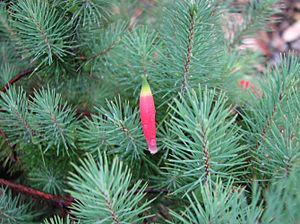Stenanthera facts for kids
Quick facts for kids Stenanthera |
|
|---|---|
 |
|
| Stenanthera pinifolia growing in Maranoa Gardens | |
| Scientific classification |
|
| Kingdom: | Plantae |
| Clade: | Tracheophytes |
| Clade: | Angiosperms |
| Clade: | Eudicots |
| Clade: | Asterids |
| Order: | Ericales |
| Family: | Ericaceae |
| Genus: | Stenanthera R.Br |
| Type species | |
| Stenanthera pinifolia |
|
| Synonyms | |
|
|
Stenanthera is a group of flowering plants that belong to the plant family called Ericaceae. Most Stenanthera plants are small shrubs. They have leaves that are lighter in color on their underside. Their flowers are shaped like tubes, and their fruits are a type of drupe, which means they have a hard pit inside. There are three known species in this group. These species used to be part of another plant group called Astroloma.
Contents
What Stenanthera Plants Look Like
Stenanthera plants are usually small shrubs. Their leaves are often paler on the bottom. The veins on the underside of the leaves usually run almost parallel to each other.
The flowers grow where the leaves meet the stem. Each flower has both male and female parts, so it can make seeds. At the bottom of each flower, there are small, leaf-like parts called bracts and bracteoles. The petals of the flower are joined together to form a tube shape.
The tips of the petals are often triangular or egg-shaped. They can stand upright or bend backward. These petal tips usually have tiny hairs on their inside surface. The parts that hold pollen, called anthers, stick out from the petal tube. However, they are often hidden by the petal tips. The style, which is a thin stalk that supports the part that receives pollen, is about the same length as the petal tube or a little longer. The fruit of the plant is a drupe, which has a very hard inner layer around the seed.
How Stenanthera Got Its Name
The group Stenanthera was first officially described in 1810. This was done by a botanist named Robert Brown. He wrote about it in his book Prodromus Florae Novae Hollandiae et Insulae Van Diemen. The main example species for this group is S. pinifolia.
Later, in 1868, another botanist named George Bentham moved these plants into the Astroloma group. He called them Astroloma sect. Stenanthera. But after new studies of plant genetics in 2013, scientists decided that Stenanthera should be its own separate group again.
The name Stenanthera comes from two ancient Greek words. "Stenos" means "narrow," and "anthera" means "flower."
Types of Stenanthera Plants
As of January 2020, the Australian Plant Census recognizes these three species of Stenanthera:
- Stenanthera conostephioides (also known as flame heath) - You can find this plant in South Australia and Victoria.
- Stenanthera pinifolia (also known as pine heath) – This species grows in New South Wales, Victoria, and Tasmania.
- Stenanthera pungens – This plant is found in Western Australia.
Where Stenanthera Plants Grow
Stenanthera species are found in two main areas of Australia. They grow in the southwestern part of Western Australia. They are also found in southeastern Australia.
Growing Stenanthera in Gardens
Stenanthera plants can be a bit tricky to grow and keep alive in a garden. However, S. pinifolia can be grown from cuttings. It does best in soil that drains water well and in a spot that gets some shade.
See also
 In Spanish: Stenanthera para niños
In Spanish: Stenanthera para niños
 | Delilah Pierce |
 | Gordon Parks |
 | Augusta Savage |
 | Charles Ethan Porter |

